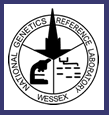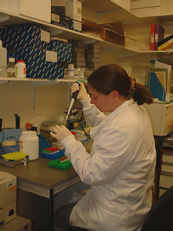|
Project
Leader: Dr Helen
White
Invasive prenatal diagnosis is offered routinely to pregnant women
who have been identified as having an increased risk of foetal
chromosome abnormalities. Pregnancies at high risk are identified
by serum or ultrasound screening, advanced maternal age or because
one parent is known to carry a chromosome abnormality. Invasive
sampling takes place at either 10-12 weeks (chorionic villus sampling)
or 15-20 weeks (amniocentesis) and diagnosis has traditionally
been based on karyotype analysis which can detect both numerical
and structural chromosome abnormalities. The most commonly detected
abnormalities are trisomies for chromosome 21 (Down syndrome),
chromosome 18 (Edwards syndrome), chromosome 13 (Patau syndrome)
and sex chromosome aneuploidy (leading to syndromes such as Turner
(monosomy X) and Klinefelter (XXY)).
In an effort to improve pregnancy management and alleviate maternal
anxiety rapid aneuploidy detection techniques are now being implemented
into routine prenatal diagnosis e.g. interphase FISH, quantitative
fluorescent PCR (QF PCR), multiplex ligation dependent amplification
(MLPA). These tests are usually capable of delivering results within
1-3 days and are viewed as a prelude to, rather than a replacement
of, full karyotype analysis.
Rapid prenatal aneuploidy tests need to fulfil certain criteria:
the assay must be accurate and no false positive results should
be obtained as this could result in the termination of a healthy
pregnancy. The test should be robust enough to cope with variable
sample quality, provide unambiguous results and have a low failure
rate. Ambiguous results have the potential to increase maternal
anxiety and can cause delays in reporting while additional investigations
are carried out. The test should be adaptable to cope with high
sample throughput and test costs should be low since rapid tests
are often performed in addition to karyotyping. Ideally, the test
should be able to detect maternal cell contamination (MCC), mosaicism
and triploidy (Mann et al., Strategies for the rapid prenatal diagnosis
of chromosomal aneuploidy. Eur J Hum Genet 2004, 12: 907-15).
QF PCR analysis of short tandem repeats (STR) is being used successfully
in many UK and European laboratories for the rapid diagnosis of
prenatal aneuploidy. Chromosome specific polymorphic repeat sequences,
which vary in length between individuals, are amplified using fluorescent
primers. The PCR amplicons are analysed using an automated genetic
analyser capable of 2bp resolution and the representative amount
of each allele is quantified by calculating the ratio of the peak
height or area using appropriate software.
Commercially available QF-PCR kits have been launched which are
IVD/CE certified under 98/79/EC. We have evaluated two kits:
- ChromoQuant™ (versions 1 and 2)
- QST*R™ that was developed by Elucigene in collaboration with
Guy’s and St Thomas’s NHS Foundation Trust
Reports of the evaluations can be found here
|

